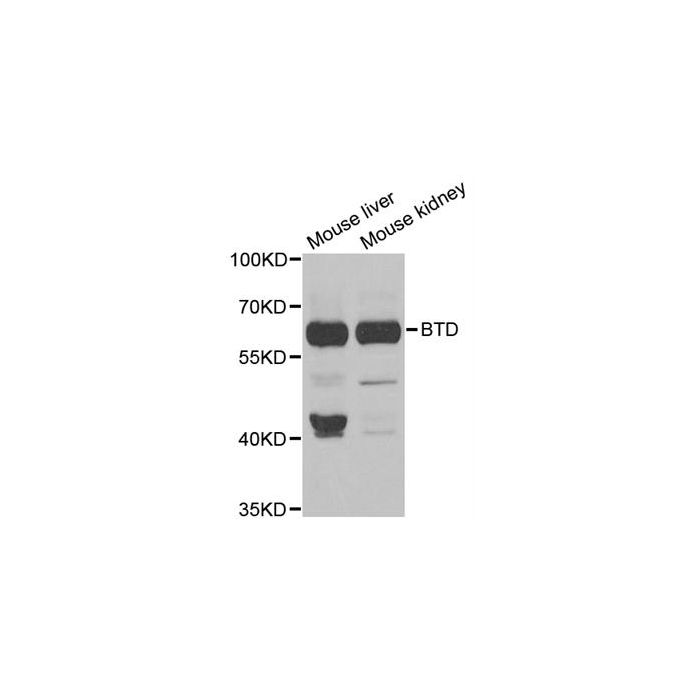BTD polyclonal, anti-human, mouse, rat
€388.00
In stock
SKU
BS8101
Background:
Biotin, also known as vitamin B7, is an essential water-soluble vitamin that is a cofactor in glucogenesis and in the metabolism of fatty acids and leucine. Biotinidase is a 523 amino acid enzyme that catalyzes the hydrolysis of biocytin to biotin and lysine. Secreted into extracellular space, biotinidase is expressed in liver, heart, placenta, brain, skeletal muscle, pancreas and kidney. Biotinidase contains one carbon-nitrogen hydrolase domain, which is involved in the reduction of organic nitrogen compounds and ammonia production. Defects in the gene encoding biotinidase are the cause of biotinidase deficiency, which is characterized by skin rash, ataxia, seizures, hearing loss, hypotonia and optic atrophy. These symptoms are due to the individual’s inability to reutilize biotin and can, therefore, typically be treated with the addition of free biotin.
Alternative Name:
Biotinidase, Biotinase, BTD
Application Dilution: WB: 1:500~1:2000, IHC: 1:50~1:200
Specificity: BTD polyclonal antibody detects endogenous levels of BTD protein.
Immunogen:
Recombinant full length Human BTD.
MW: ~ 61 kDa
Swis Prot.: P43251
Purification & Purity:
The antibody was affinity-purified from rabbit antiserum by affinity-chromatography using epitope-specific immunogen and the purity is > 95% (by SDS-PAGE).
Format:
1mg/ml in PBS with 0.1% Sodium Azide, 50% Glycerol.
Storage:
Store at 4°C short term. Aliquot and store at -20°C long term. Avoid freeze-thaw cycles.
For research use only, not for use in diagnostic procedure.
Biotin, also known as vitamin B7, is an essential water-soluble vitamin that is a cofactor in glucogenesis and in the metabolism of fatty acids and leucine. Biotinidase is a 523 amino acid enzyme that catalyzes the hydrolysis of biocytin to biotin and lysine. Secreted into extracellular space, biotinidase is expressed in liver, heart, placenta, brain, skeletal muscle, pancreas and kidney. Biotinidase contains one carbon-nitrogen hydrolase domain, which is involved in the reduction of organic nitrogen compounds and ammonia production. Defects in the gene encoding biotinidase are the cause of biotinidase deficiency, which is characterized by skin rash, ataxia, seizures, hearing loss, hypotonia and optic atrophy. These symptoms are due to the individual’s inability to reutilize biotin and can, therefore, typically be treated with the addition of free biotin.
Alternative Name:
Biotinidase, Biotinase, BTD
Application Dilution: WB: 1:500~1:2000, IHC: 1:50~1:200
Specificity: BTD polyclonal antibody detects endogenous levels of BTD protein.
Immunogen:
Recombinant full length Human BTD.
MW: ~ 61 kDa
Swis Prot.: P43251
Purification & Purity:
The antibody was affinity-purified from rabbit antiserum by affinity-chromatography using epitope-specific immunogen and the purity is > 95% (by SDS-PAGE).
Format:
1mg/ml in PBS with 0.1% Sodium Azide, 50% Glycerol.
Storage:
Store at 4°C short term. Aliquot and store at -20°C long term. Avoid freeze-thaw cycles.
For research use only, not for use in diagnostic procedure.
| Is Featured? | No |
|---|
Write Your Own Review

